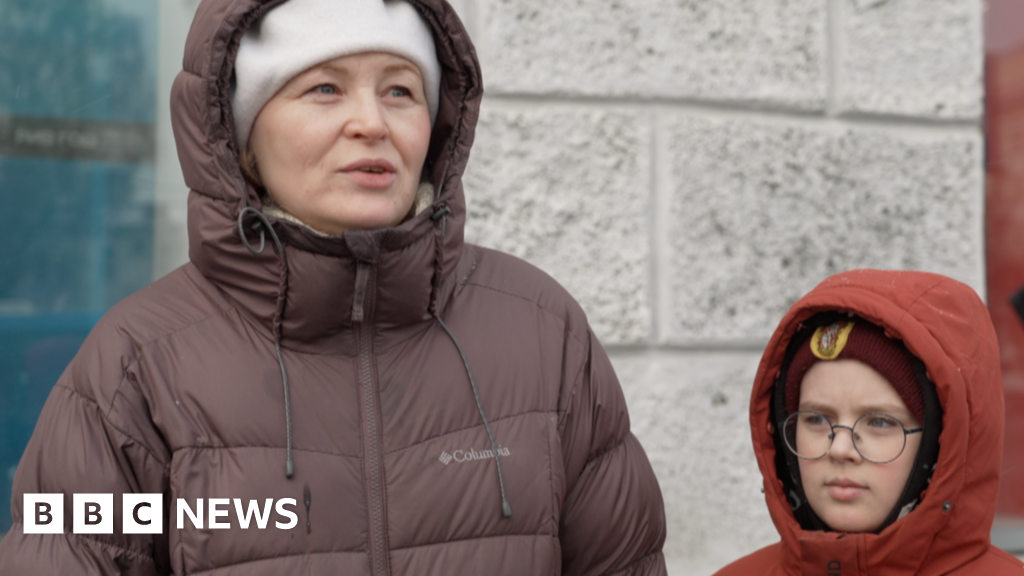Trump is a dark horse: Russians on the invasion of Ukraine, three years on
- BBC News
Driving into Tver, the first thing I notice are the soldiers.
Theyre everywhere. On billboards, the sides of buildings, at bus stops. Portraits with the words "Hero of Russia". Posters of troops with Kalashnikov rifles encouraging the public to "Love, be proud of and defend" Russia.
In other words, to sign up and go and fight in Ukraine. Three years after its full-scale invasion of its neighbour, Russia is seeking new recruits.
Despite all the military imagery around town, if you live in Tver its possible to convince yourself that life is normal. The front line is hundreds of miles away.
"Just look around," Mikhail, a local teacher, tells me. "Cars are passing by and all the shops are open. No shells are falling from anywhere. We are not panicking. We cant hear any sirens wailing. We do not run to any evacuation points."
For many Russians their invasion of Ukraine – what the Kremlin still calls a "special military operation" – is something they only encounter on their TV screens.
But for people like Anna, its much more real.
"I know a lot of people who went off to fight," Anna says when we get chatting on the street.
"Some of them never came home. I hope [the war] ends as soon as possible."
Donald Trump claims thats what he wants, too. Without inviting Ukraine to the negotiating table, the Trump administration has already entered direct talks with the Russian leadership.
What do Russians make of the US president and his overtures to Moscow?
"Trump is a dark horse," believes Anna. "Im not sure what to expect from him."
Some of the people I talk to in Tver repeat the official narrative they have been hearing for the last three years on state TV: that their country is not the aggressor, that Russia is defending Russians and Russian-speakers in Ukraine and liberating, not occupying, territory.
It doesnt mean that Russian society as a whole buys into this alternative reality.
"In a society people always prefer to be in the mainstream," believes Andrei Kolesnikov, a columnist for newtimes.ru and Novaya Gazeta. "If the mainstream is pro-war and the TV says that we are at war with the West, the average citizen will think like this. Its easier not to think about the details. You want to live peacefully, so why not join the majority?
"Some researchers call this the foetal position. When you defend yourself from this unexplainable world you look like a baby. You say: I cant explain to myself what is happening. I believe you. You can feed me with words. Ill accept it. This is typical for all societies of this kind: a bit authoritarian, a bit totalitarian."
Larissa and her husband Valery willingly accept the official line.
"Were all for the special military operation," Larissa tells me. "Were ready to volunteer and go there ourselves!"
They havent yet, clearly.
"We hope [Russia] will be victorious. We want Ukraines total capitulation."
The police turn up. Theyve received a call informing them that "suspicious-looking people with a camera" are going around Tver. Meaning us.
Theyre polite but want to know why were here. They take a statement from our driver. They check our vehicle. They ask me for an official explanation for our visit. I tell them were gauging the mood away from Moscow. We show our documents, which are in order.
While weve been talking to the officers, a camera crew from Russian state TV has pitched up and started filming us.
"We were just passing," says the reporter, "and we spotted the police and recognised you. Can you tell me whats going on?"
"I dont know," I reply. "Perhaps you can tell us?"
"What have you been filming?"
"Weve been talking to people on the street," I say. "I believe were allowed to do that."
"Yes, in our country we have freedom of speech," the reporter replies. "Perhaps the police just want to help you? Its unpleasant to hear Western TV spreading fake news that theres no free speech in Russia. Youre talking to people freely and no one gets in your way."
"Apart from you," I point out. "And the police officers standing next to our car."
The incident, which lasted about an hour, is no real surprise. Three years of war have fuelled suspicion of the West inside Russia. Early signs of a thaw in US-Russian relations have yet to change that.
From talking to people in Tver it becomes clear that Russians are hoping that an end to the fighting will bring economic relief.
"Prices are so high now for the things I need most," says Yulia as she rocks her baby to sleep in a pram. "Like the price of potatoes and onions. I really feel it."
But teacher Mikhail doesnt feel that Donald Trump has any strategy for securing peace.
"Unfortunately, Trump hasnt got any plan," believes Mikhail. "He is an improviser. He doesnt know what hes going to do. My sympathies are with him. Im glad he won. But speaking about this episode, were all in the dark. And Trump is in the dark himself."